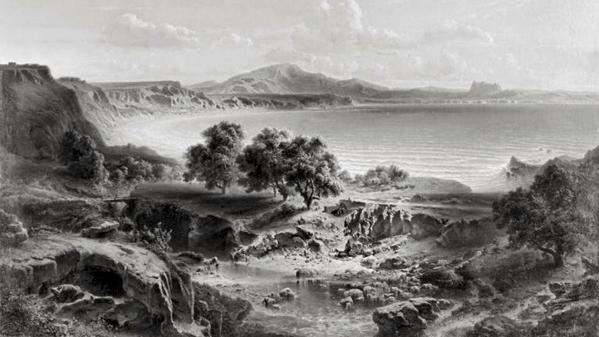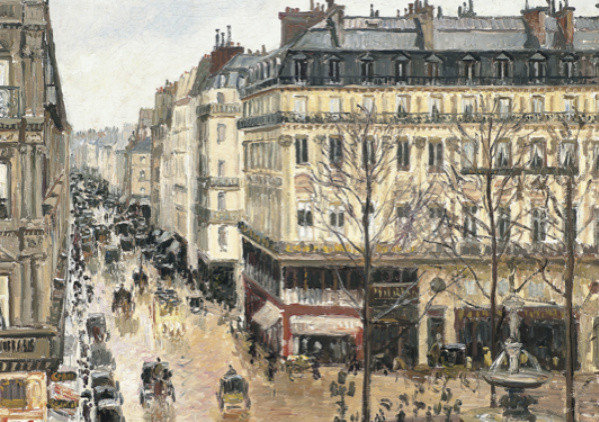The German Advisory Commission for the Return of Cultural Property Seized as a Result of Nazi Persecution, Especially Jewish Property (Beratende Kommission) has issued its latest decision concerning allegedly Nazi-looted art in German museums. For the second case in a row after the widely (and wisely) derided opinion not to restitute the Welfenschatz or Guelph Treasure at the Stiftung Preussischer Kulturbesitz in Berlin, the commission (known for its presiding member, former German Supreme Constitutional Court judge Jutta Limbach) has recommended against restitution, this time over the claim by heirs of Clara Levy to The Three Graces (Drei Grazien) by Lovis Corinth (1902/1904). The decision (available only in German) is riddled with poor logic and basic historical errors. In short, while it may be that the painting was indeed delivered to Clara Levy’s daughter in the United States at Clark’s express instruction, that is far less clear than the commission states, and its decision further makes a number of assumptions about the circumstances of Jews in occupied or about-to-be occupied territories that undermine its credibility considerably.
Limbach Commission Rules Against Claimants to Restitution of “Three Graces” by Lovis Corinth in Unpersuasive Opinion
Topics: Berlin, Else Bergmann, Schleifmühle, Hildebrand Gurlitt, Cornelius Gurlitt, Ludwig Levy, Fritz Levy, Rita Hubbard, Germany, Nazi-looted art, bill of lading, Especially Jewish Property, Buchholz Gallery, Madame Soler, German Advisory Commission for the Return of Cultu, San Francisco, Entartete Kunst, Beratende Kommission, Stiftung Preussischer Kulturbesitz, FSIA, Curt Valentin, expropriation exception”, Gurlitt, Restitution, Max Huggler, Mendelssohn-Bartholdy, Clara Levy, Sigfried Rosengart, Luxembourg, Henry Zacharias, Compagnie Generale Transatlantique Hol Lesquette, World War II, Foreign Sovereign Immunities, Pinakothek der Moderne, degenerate art, beschlagnahmte Kunst, Jutta Limbach, Kunstmuseum Bern, Drei Grazien, Pablo Picasso, Lovis Corinth, Museums, Three Graces, Bavarian State Painting Collections, Federal Republic of Germany, Paula Levy, Kurt Buchholz, Welfenschatz, Limbach Commission, New York, Bayerische Staatsgemäldesammlungen
Bavarian State Paintings Collection in the News Again, May Face Claims from Eva Braun Heirs
Quite by coincidence, two stories we have covered in the last few days have centered around the claims by the heirs of Paul von Mendelssohn Bartholdy, a Jewish banker and art collector who was the target of Nazi persecution before he died in 1935: Julius Schoeps, Edelgard von Lavergne-Peguilhen, and Florence Kesselstatt. Another common thread has been the Bavarian State Paintings Collection (the Bayerische Staatsgemäldesammlung), which is in the news again for possible claims, but this time from heirs of quite a different sort.
Topics: Paul von Mendelssohn Bartholdy, Fritz Bamberger, Focus, Florence Kesselstatt, Karl Blechen, Karl Ernst Baumann, Julius Schoeps, Dr Alexander Lewin, Germany, Anselm Feuerbach, Hans Sachs, German Advisory Commission for the Return of Cultu, Gurlitt case, Edelgard von Lavergne-Peguilhen, Julius and Clara Freund, Eva Braun, Nürnberger Institut, Johann J. August von der Embde, Stiftung Preussischer Kulturbesitz, 'Stürmer-Bibliothek', Wilhelm Leibl, Jim Tobias, Portrait der Familie von Dithfurth, Restitution, Bavarian State Paintings Collection, Bayerische Staatsgemäldesammlung, Der Spiegel, World War II, Peasant Girl without a Hat and with a White Headcl, Pinakothek der Moderne, Prussian Cultural Heritage Foundation, Austria, Andrea Bambi Mountain Landscape on the Spanish Coa, Jutta Limbach, Washington Principles, Der Stürmer, Welfenschatz, Limbach Commission
Claims by Mendelssohn Bartholdy Heirs over Picasso "Madame Soler" Dismissed, Court Finds No FSIA Jurisdiction After Evidentiary Hearings
The U.S. District Court for the Southern District of New York has dismissed claims for ownership of Madame Soler by Pablo Picasso, currently at the Pinakothek der Moderne in Munich. Just as the relevance of Judge Jed Rakoff’s comments over another art restitution case brought by the heirs of Paul von Mendelssohn Bartholdy unexpectedly came to the fore recently, Judge Rakoff’s decision is now the most recent in a line of frustrations for the heirs of Mendelssohn Bartholdy, a victim of Nazi persecution in Berlin in the 1930s. The ramifications of this case may be fairly narrow, however, as the case was premised on allegations of specific transactions in New York rather than general allegations about the conduct of Germany. The claimants could appeal, or perhaps turn to the Limbach Commission if they could be heard (the Pinakothek is a subdivision of Germany for jurisdictional analysis, but it’s unclear at first blush if the Commission would view this claim as within its province).
Topics: Paul von Mendelssohn Bartholdy, Berlin, commercial activity exception, Cornelius Gurlitt, Florence Kesselstatt, Judge Jed Rakoff, Halldor Soehner, Saint-Jean-Cap-Ferrat, Julius Schoeps, Upper East Side, Prussia, Max Liebermann, Night Café, Gurlitt Collection, Foreign Sovereign Immunities Act, Preussen, France, State Paintings Collection, Madame Soler, Museum of Modern Art, Edelgard von Lavergne-Peguilhen, Van Gogh, Munich, Justin K. Thannhauser, FSIA, expropriation exception”, Nazi persecution, Boy Leading a Horse, Restitution, David Toren, Bayerische Staatsgemäldesammlung, Bavarian State Ministry for Education and Culture, Free State of Bavaria, World War II, Foreign Sovereign Immunities, Pinakothek der Moderne, Bayerisches Staatsministerium für Bildung und Kult, Bundesländer, Altmann v. Republic of Austria, Freistaat Bayern, Le Moulin de la Galette, Kurt Martin, München, Pablo Picasso, Federal Republic of Germany, Limbach Commission, Wissenschaft und Kunst
Cassirer Heirs' Claims to Pissarro Work Revived by Appeals Court, the Year 2013 Shows that the Tide for Restitution May be Shifting Again
The U.S. Court of Appeals for the 9th Circuit restored last week claims by heirs of Lilly Cassirer against the Thyssen-Bornemisza Collection for the return of the Camille Pissarro painting Rue St. Honoré, après-midi, êffet de pluie.
Topics: Nuremberg laws, Schwabinger Kunstfund, Cornelius Gurlitt, Lilly Cassirer, California Code of Civil Procedure § 338(c), Dorothy Nelson, Thyssen-Bornemisza Collection, Julius Schoeps, Rue St. Honoré après-midi êffet de pluie, Claude Cassirer, Von Saher v. Norton Simon, de Csepel, Jacques Goudstikker, California Code of Civil Procedure § 354.3, Gurlitt Collection, Foreign Sovereign Immunities Act, Hans Sachs, Von Saher v. Norton Simon Museum of Art at Pasaden, Madame Soler, Bundesgerichtshof, Hildebrand Gurlit, Entartete Kunst, Hans-Heinrich Thyssen-Bornemisza, Hungarian National Gallery, Nazis, Munich, Deutches Historisches Museum, FSIA, Preemption, Gurlitt, Harry Pregerson, Restitution, field preemption, Marei Von Saher, Herzog collection, Bavaria, Claudia Seger-Thomschitz, Looted Art, World War II, Foreign Sovereign Immunities, Pinakothek der Moderne, degenerate art, Altmann v. Republic of Austria, 578 F.3d 1016, Freistaat Bayern, beschlagnahmte Kunst, Camille Pissarro, Kim McLane Wardlaw, Nürnberger Gesetze, Raubkunst, Museum of Fine Arts Boston, Cassirer v. Thyssen-Bornemisza Collection, verschollene Kunst, Kunstfund München





